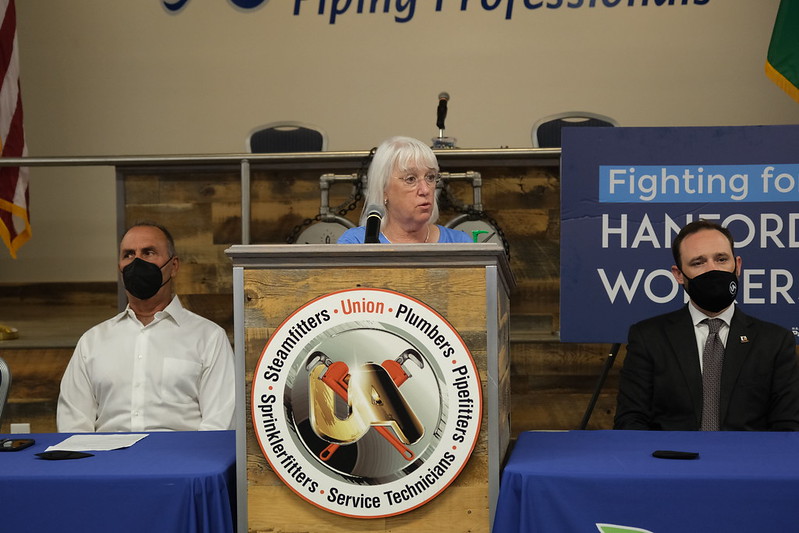VIDEO: Senator Murray Speaks on Senate Floor About Her Bill to Help Hanford Workers Suffering from Toxic Beryllium Exposure, Legislation Included in Must-Pass Defense Bill – MÁS AQUÍ
FOTOS: Senator Murray Meets with Hanford Workers, Announces Bill to Help Workers Access Care for Beryllium Exposure — MÁS AQUÍ
Senator Murray: “At the end of the day, supporting our men and women in uniform is about a lot more than just investing in weapons or facilities—it’s about ensuring our servicemembers and their families have the support they deserve throughout their lives, and know that their nation has their back.”
Washington DC – Today, U.S. Senator Patty Murray (D-WA), Chair of the Senate Appropriations Committee, voted for final passage of the National Defense Authorization Act for Fiscal Year 2024 (NDAA), which—among many other things—includes Senator Murray’s Ley de imparcialidad en las pruebas de berilio, legislation that will help more Hanford workers and nuclear weapons complex workers across the country access care for diseases caused by toxic beryllium exposure. The NDAA passed the Senate by a vote of 87-13 tonight and the legislation now heads to the House of Representatives.
“Beryllium exposure is a serious health risk for Hanford workers, but not everyone who needs medical benefits to help treat diseases caused by beryllium exposure can get them—and that’s because the law doesn’t match today’s science,” dijo el senador Murray. "I have always cared deeply about the safety and wellbeing of the workers at Hanford—I believe I have a serious obligation as their voice in the United States Senate to fight for the protections and benefits they deserve. Hanford workers should not have to jump through unnecessary hoops to get the care they need—my bill will update the statute so it’s consistent with today’s science and make sure we don’t lose precious time getting workers the support they need to manage this awful disease.”
“Importantly, this year’s NDAA also includes a pay boost for our military and civilian personnel—the largest pay bump in over two decades—which is long overdue,” Murray continuó. “At the end of the day, supporting our men and women in uniform is about a lot more than just investing in weapons or facilities—it’s about ensuring our servicemembers and their families have the support they deserve throughout their lives, and know that their nation has their back.”
El senador Murray presentó el Ley de imparcialidad en las pruebas de berilio last September—after meeting with Hanford workers—to expand access to care for diseases caused by beryllium exposure. Currently, federal law places an outdated overly burdensome proof of illness requirement on nuclear weapons complex workers, preventing many workers from getting the care they need. The Ley de imparcialidad en las pruebas de berilio will update these testing requirements to be consistent with the latest science to ensure that more nuclear complex weapons workers—past and present—dealing with health issues caused by beryllium exposure receive the health care benefits they need and deserve. Senator Murray spoke on the Senate floor about her legislation in July—video is AQUÍ and additional information about the legislation is AQUÍ.
In addition to including the Beryllium Testing Fairness Act, the NDAA bill Senator Murray helped pass would:
- Boost pay for military and civilian personnel by 5.2 percent—the largest pay increase in more than 20 years;
- Improve care and education services for military families, including by authorizing DOD to provide funding to local education agencies supporting children of servicemembers and extending support for re-licensure of spouses affected by military moves and adding doula certifications to the list of eligible professions;
- Require a report on family planning and cryopreservation including the number of servicemembers who leave the service for family planning reasons, whether cryopreservation would lead to greater retention of servicemembers, and methods for DOD to offer cryopreservation to active-duty members;
- Require military bases to have a Tribal liaison with an Indian Tribe, Native Hawaiian organization, or Tribal interest in the area surrounding the installation to have a Tribal liaison located at the base.
In addition, the legislation also authorizes:
- Over $227 million for improvements at the Lewis-McChord Joint Base;
- $65 million for improvements at the Kitsap Naval Base;
- Over $11 million for the service facility at the Whidbey Island Naval Air Station;
- $3.6 million for the National Guard Reserve at Campy Murray; and
- $960K for the Yakima Training Center Battle Course Planning.
###


